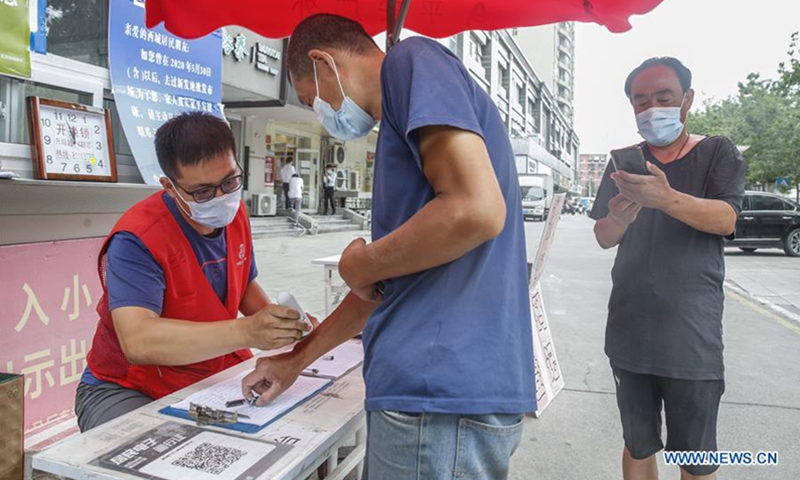Beijing outbreak to ease this week
By Leng Shumei Source:Global Times Published: 2020/6/22 10:38:17 Last Updated: 2020/6/22 21:38:17
City's quick, strict measures contain latest COVID-19 clustered infections

Residents register for entering a community in Xicheng District of Beijing, capital of China, June 17, 2020. Beijing has upgraded its emergency response to COVID-19 from Level III to Level II, the second-highest of the four-tier system, as the city is battling to contain new clusters of COVID-19. Photo: Xinhua
Experts estimated the COVID-19 outbreak in Beijing will ease this week after the capital reported nine new cases on Sunday, the first time the city's daily new cases fell to single digits since June 12.
The achievement is the result of quick, strict measures that have effectively curbed the virus' spread after cases related to the Xinfadi market were discovered, experts said.
The nine cases came from the districts of Fengtai (five), Haidian (two), Xicheng (one) and Chaoyang (one).
Two suspected cases and five asymptomatic cases were also reported over the weekend, according to local health authorities.
"It is good news, indicating that anti-epidemic measures in Beijing are effective," Wang Guangfa, a respiratory expert at Peking University First Hospital, told the Global Times on Monday, noting that although the virus has been transmitted in some communities, no large-scale transmission occurred.
Wang noted that the news came eight days - the average incubation period of the novel coronavirus - after the reports of the cases in this wave. The decline in new cases on Sunday conforms to epidemiological patterns.
He called for continuous strict measures and looked forward to tracing the source of these new clustered infections, highlighting a recent case in Tianjin that also proved related to the Xinfadi market.
This outbreak in Beijing started on June 11 after a domestic case connected to the Xinfadi market in Fengtai was detected, following zero reports of domestic cases in Beijing for 56 consecutive days.
From June 11 to June 21, Beijing reported 236 COVID-19 cases, all of whom have been hospitalized. Another 22 asymptomatic cases are under medical observation, local authorities said.
Yang Gonghuan, a former vice director of the Chinese Center for Disease Control and Prevention, told the Global Times on Monday that the outbreak in Beijing showed that disinfection in places full of people, such as wet wholesale markets, has to be taken seriously. Population flow control or social distancing measures have to be implemented properly in these places.
Yang said this outbreak in Beijing is not a second wave, but the possibility of such a second wave could not be ruled out if the virus doesn't disappear before winter comes. "We need to remain serious in epidemic control and prevention while maintaining a relaxed mood."
Yang Zhanqiu, deputy director of the pathogen biology department at Wuhan University, estimated that the outbreak could be controlled in the following week.
"Sporadic cases may be reported, but there won't be days that witness dozens of new cases," Yang Zhanqiu told the Global Times on Monday.
"Unlike the outbreak in Wuhan, the path of contagion of the clustered infections in Xinfadi market is clear, so the human-to-human transmission can be effectively cut off in a timely way," Yang Zhanqiu noted.
In response to the outbreak, Beijing has been beefing up its prevention measures. It raised the emergency response level from Level III to Level II on June 16. More than 2 million local residents had submitted samples for COVID-19 nucleic acid tests as of Saturday.
Wu Hao, head of the Fangzhuang community health service center, told China Central Television on Sunday that the outbreak in Beijing would enter a stationary plateau with the daily new cases at a certain number for about one week.
The results of previous nucleic acid tests would gradually come out during this period. "We would observe the results to decide whether they are related to the Xinfadi market. If yes, we can basically confirm that all the cases in this outbreak were connected to Xinfadi," according to Wu.
At the beginning of the outbreak, people worried that Beijing would become a second Wuhan.
Zhang Wenhong, a Shanghai-based infectious disease expert, said in an online forum on Monday that the latest outbreak in Beijing alarmed the country, but there were two differences between the latest outbreak in Beijing and the one in Wuhan. First, Beijing reacted much more quickly and, second, as the capital city, it focused on key areas, and the local economy and society were not suspended as was the case in Wuhan.
Posted in: SOCIETY